Zotac H55-ITX Review - The World's First mini-ITX H55 Motherboard
by Joshua Youngberg on February 28, 2010 12:00 AM EST- Posted in
- Motherboards
Performance summary
App and Gaming Performance
We found that the H55-ITX performs comparably to the other H55/P55 motherboards on the market during system benchmarking.
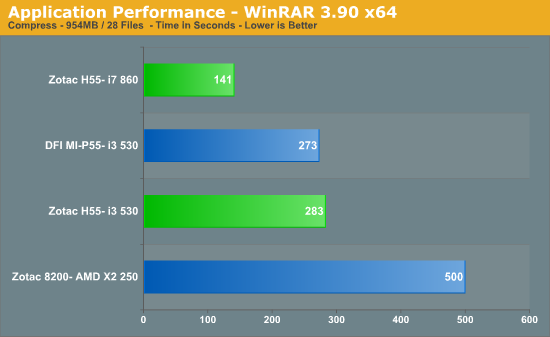
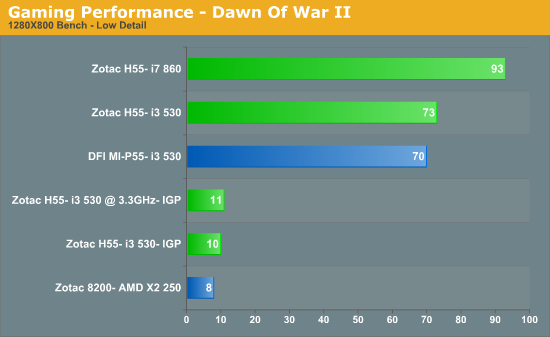
Power Consumption
For our system power consumption tests we measure the watts being pulled out from the wall socket by the entire system. Keep in mind that power consumption at the wall can vary for a specific system based on the efficiency of the power supply being used. For these tests every power saving option in the BIOSes were turned on.
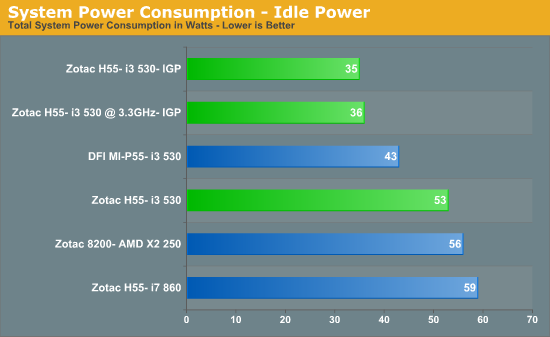
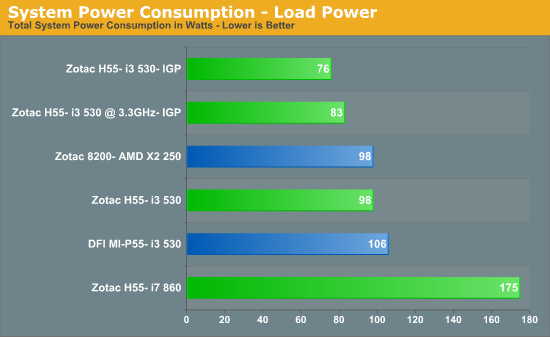
The Zotac H55-ITX put down some of the lowest idle power consumption numbers that I have ever recorded on a desktop. System consumption under 100% CPU load was very mild as well. Numbers this low would make the H55-ITX ideal for a system that is rarely shutdown, like a HTPC.
Audio Latency
During our battery of tests we also measure DPC latency. This will be of particular interest to the audiophiles of the world.
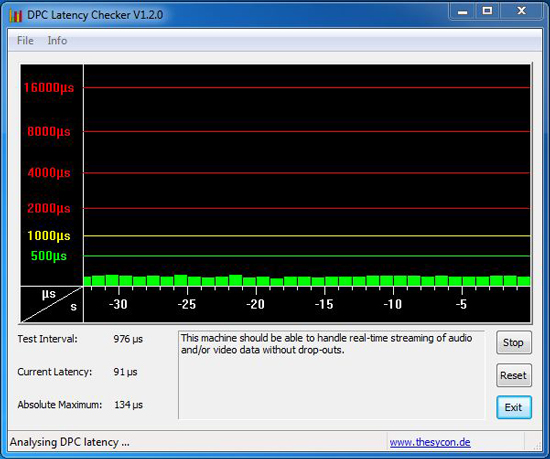
Overclocking
While testing the H55-ITX we decided to take a different turn for the overclocking segment. Instead of pushing the board to its limits in order to find its maximum frequencies we chose to find the perfect balance between speed and voltage. The fact that the VRM for CPU Vcore is very restricted and that the BIOS offered no adjustment for CPU VTT voltage helped point us in this direction.
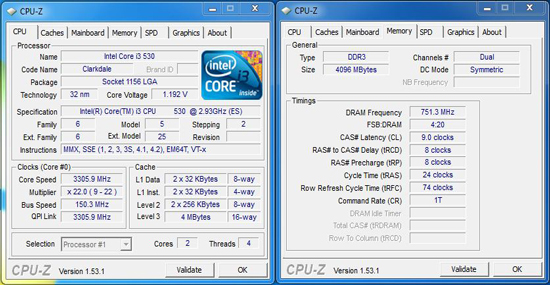
To reach our final overclock on our i3 530 I simply raised the Bclock to 150, lowered the Vcore to the default, 1.20V, minus .025V and adjusted the Vdimm to 1.65V. 1.175V was the lowest Vcore we could use to maintain a 150 Bclock. All other available voltages were untouched. For system memory the timings were manually set to 9-9-9-24-72 and the frequency was set at 1500MHz. On a side note, I ran this system in a Silverstone SG06 and using the factory Intel heatsink core temperatures rarely got above 50 degrees Celsius.
We chose not to overclock the i7 860 to avoid any risk to the ZOTAC motherboards power circuitry. The H55-ITX simply wasn't designed to power a heavily overclocked quad core.










69 Comments
View All Comments
Duwelon - Sunday, February 28, 2010 - link
Wrong.GeorgeH - Sunday, February 28, 2010 - link
Actually, very not wrong.After a quick search, it looks like PCP&C 610W is only about 50% efficient at 30-40W (AC power) and about 70% at 70-60W.
This means the DC idle/load wattage numbers on the IGP are ~20W/50W. With a power supply rated at ~85% in that region, the measured power would be ~25W/60W, which is hugely different from the stated 35/76W - 30% "error" on the low end is pretty crappy.
michal1980 - Sunday, February 28, 2010 - link
really? tomshard was able to get idle power down to ~25wattshttp://www.tomshardware.com/reviews/25w-performanc...">http://www.tomshardware.com/reviews/25w-performanc...
now whos wrong?
have an address I have some crows pie to ship you.
mariush - Monday, March 1, 2010 - link
I'd rather use a bigger power supply (possible a Zen 400W passive one) and have the system use 40W instead of using that 220W power supply tom's hardware uses, with a 40 mm NOISY fan, just to get 22W.The difference in watts is so small my cell phone charger eats it when I leave it plugged in over night to charge my phone.
Duwelon - Sunday, February 28, 2010 - link
So efficiency does or doesn't matter with you? Reality shows efficiency is all that matters as long as you have a stable and fairly priced PSU...michal1980 - Sunday, February 28, 2010 - link
efficeny matters. But I doubt that a 610w power supply is very efficent @ 30watts.have you ever heard of the right tool for the job?
mindless1 - Sunday, February 28, 2010 - link
Have you ever heard of gathering more evidence before jumping to conclusions?The purpose is a relative, not necessarily absolute power measurement. Think about it, they are not trying to match every possible system configuration a user could have.
For that, a 610W PSU is fine.
Further, you don't factually know what the right tool for the job is because neither Tom's, nor most reviewers, test long term with minimally sized PSU (that tend to fail prematurely when ran at a higher % of total load rating).
The right tool for the job is not really the most efficient without considering anything else. Think about it, if you really cared about efficiency you would turn off the computer you are using instead to post on the internet!
michal1980 - Sunday, February 28, 2010 - link
what false conclusion? Did you even look at this review?except for the 860 cpu, @ load the system used less then 110watts of power. Using a PSU thats rated 6x that is a waste, on both ends, idle, and peak.
PSU's certified for 80+, have tragets at 20, 50, and 80% of loads. The efficency of most, if not all falls significantly below a 20% load.
a quailty 200W psu would be a much better fit for most systems builds then any 600w psu.
Duwelon - Sunday, February 28, 2010 - link
Have you ever heard of admitting your original statement was wrong to just move on? Thanks for admitting efficiency does matter after your first blunder and then acting like a turd to defend it. No doubt you can find a better PSU, but at least now we know you're smart enough to realize efficiency does matter and you don't think it's pulling 610watts out of the socket or something. Have a nice day.michal1980 - Sunday, February 28, 2010 - link
wrong about what?a 610 watt psu is overkill for a system running ~30-150w.
If you cannot understand that, you are too stupid to even continue this disscussion